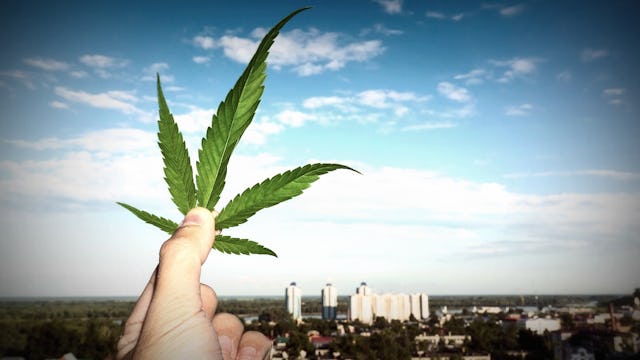PSA: Flying With Marijuana Is A No-Go

I was in a marijuana-legal state a few months ago, and a dear friend had been sweet enough to buy me a big-ass bottle of edibles. Not just edibles, edible mint-like candies that tasted great, killed your anxiety, and came in fairly stealth packaging. The only problems: one, the mints looked like tiny pot leaves. Two, I’d be flying with marijuana from a weed-legal state to my backward-ass-non-weed-legal state, and though I knew the chances of getting caught with it were slim, I didn’t want a drug conviction on my record.
So it was with great regret that I doled the candies out to my buddies before I stepped on the plane. It was a pretty clear-cut situation: I was flying from a legal state to a non-legal state, where I could get busted for marijuana possession. Simple.
What’s not so simple? Flying with marijuana between weed-legal states. Most people think it’s okay. I mean, if pot’s legal at both your departure and destination, what’s the problem, right?
Not so fast, Space Cowboy.
Here’s the problem. Marijuana remains illegal under federal law despite medical cannabis laws in 46 states and the District of Columbia. Nine states have legalized marijuana for recreational use in adults (Colorado, Washington, Alaska, Oregon, California, Maine, Massachusetts, Nevada, and Vermont), with bills pending or under study in many, many others, according to the National Council of State Legislatures.
However, the federal government, according to Safe Access Now, regulates drugs through the Controlled Substance Act, which doesn’t see the difference between the medical and recreational use of marijuana, and treats it like any other controlled substance such as cocaine and heroin. Moreover, the government brands it a Schedule 1 Drug, which means it sees cannabis as highly addictive and without medicinal value.
And guess who governs everything past airport security, including TSA? The feds, man.
So even if you bought your pot legally in say, Oregon, once you bring it past the security checkpoint, those same edibles are now illegal, and you can get busted for them. As USA Today puts it, “Bringing legally purchased pot past a security checkpoint … can still trigger a law enforcement response.” That includes states in which marijuana is legal. I’ll say it again: stepping through that TSA line turns your legal weed into the devil’s lettuce.
Of course, the TSA says they’re all about finding bombs, explosives, guns, and the things that pose a real danger to passengers, not the pot you stuffed into your carry-ons or checked luggage. But a TSA representative told Scary Mommy that if they happen to find it, their policy is to call airport security. Which could be embarrassing at best, and land you in jail at the worst. Whatever happens, you are totally missing your flight.
Spokesperson Lorie Dankers told USA Today, “The passenger’s originating and destination airports are not taken into account. TSA’s response to the discovery of marijuana is the same in every state and at every airport — regardless of whether marijuana has been or is going to be legalized.”
Airport police response varies. La Guardia police don’t do anything, because, as they say, “a state-legal amount of medical of recreational marijuana” is not a crime. For the most part, airports in California aren’t having a problem — people don’t seem to want to risk it.
Nevada, on the other hand, is pro-active. Vegas’s airport has a site-wide ban on the substance, and starting soon, will offer amnesty boxes for people who bring it onto the premises. They will be located outside of the building, in places like rental car returns. Denver also prohibits it on airport property, but says it’s been discovered so infrequently that it doesn’t bother to keep track of police contacts about it anymore.
So even if you’re flying from Oregon or Washington down into Cali, leave your weed at home, lest you get busted for marijuana possession. Give it to friends and buy some more at your destination. It’s not worth the risk. Until federal law changes, at least. Which we can only hope will be as soon as possible.
This article was originally published on